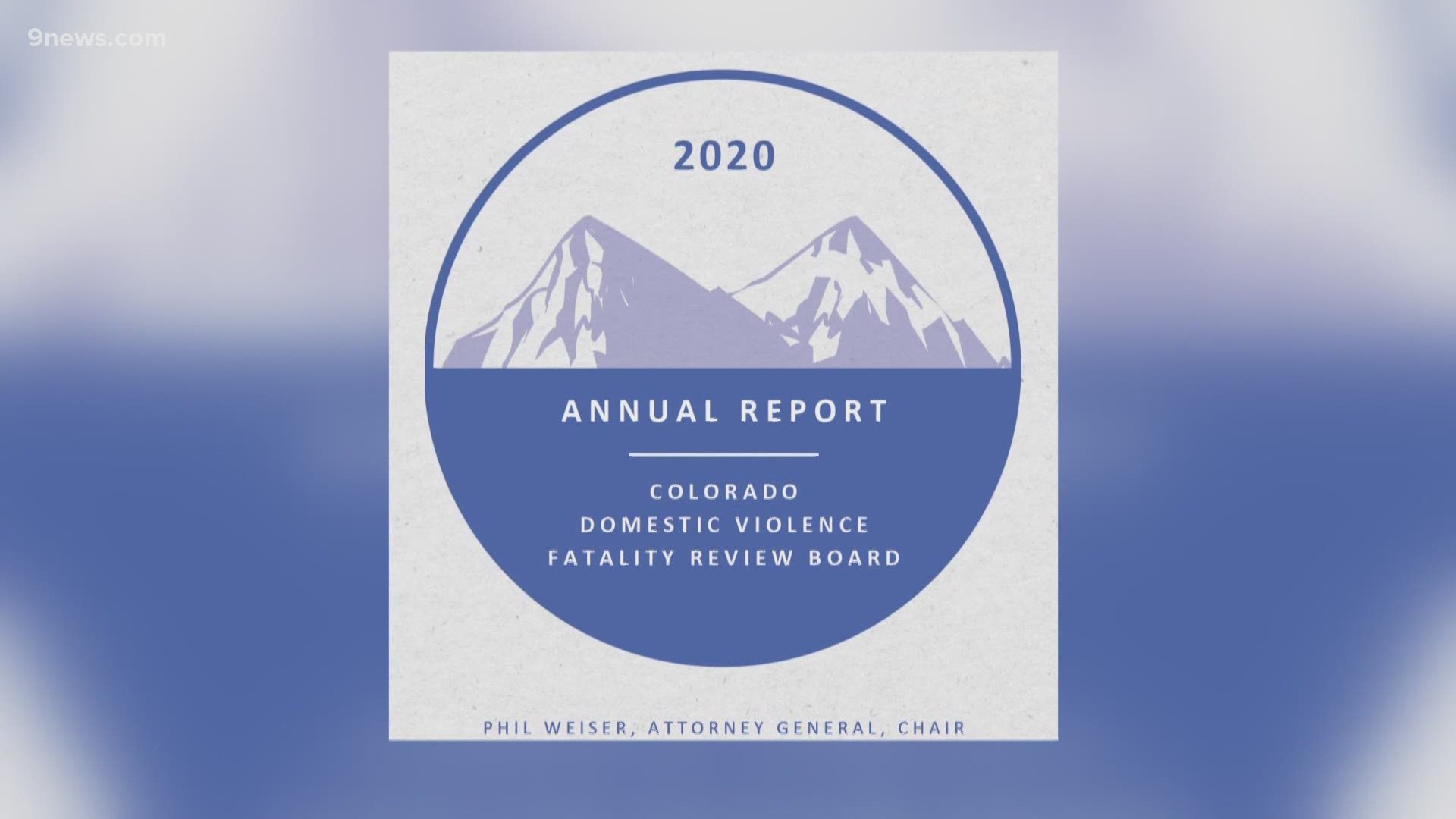DENVER — A report released Friday by the Colorado Attorney General's office reveals 70 Coloradans died in 2019 as the result of domestic violence, a 62.7% increase from 2018.
"The increase that we've seen from 2018 to 2019 is definitely shocking and very concerning," Jenn Doe, the executive director of the Denver Domestic Violence Coordinating Council told 9NEWS.
Doe believes improved data collection and an overall rise in violent crime can help explain the increased fatality seen in 2019, but doesn't fully "account for this drastic of an increase."
Here are the report's topline findings:
- At least 60 domestic violence incidents statewide resulted in 70 deaths.
- Of those deaths, 55.7% were the primary victim of domestic violence.
- The majority of the victims killed were women.
- 64.2% of the deaths were the result of gunshot wounds.
- 19 children were involved in 20% of the 60 incidents.
The youngest victim of the year was Ty Tesoriero.
His mother, Jing Tesoriero, told 9NEWS Ty was 10 years old when his father shot him and then himself.
"I mostly noticed domestic violence after the divorce back in 2015. There was a lot of power and control. There were a lot of threats and harassment. I had to move to Colorado because of that with my son, Ty. My ex-husband, Anthony, followed us," Tesoriero told 9NEWS.
Doe, well aware of Ty's case, explained power and control are often part of a pattern in domestic violence.
"So, when there is a sense that power and control are being lost, abusers will go to extreme lengths to try to regain and maintain that power and control over their victims," she said.
Domestic violence doesn't always resemble the portrayals in movies and television.
Even Doe had "a lot of misconceptions about what domestic violence was and what it looked like," before she encountered it herself.
After she separated from her husband in 2006, Doe told 9NEWS he stabbed both her and her best friend, Pamela Ham Gonzales. Doe survived, but Gonzales didn't make it.
"It had not been a physically abusive relationship prior to the separation. It was a lot of jealousy, emotional abuse and controlling behavior. It very quickly escalated to homicidal behavior. I think that showed me this truly can happen to anyone," Doe said. The report makes a number of recommendations to ensure it doesn't.
- Increase support available to children exposed to domestic violence.
- Doe: "Many people who use abusive behaviors, either witnessed or were abused themselves as children. Not every child who witnesses abuse or experiences abuse will grow up to be an abuser, but it certainly does happen. So, we want to do whatever we can to get resources to those children who've been exposed to domestic violence to help build their protective factors and give them coping skills so they hopefully don't grow up to think that's normal."
- Doe: "Many people who use abusive behaviors, either witnessed or were abused themselves as children. Not every child who witnesses abuse or experiences abuse will grow up to be an abuser, but it certainly does happen. So, we want to do whatever we can to get resources to those children who've been exposed to domestic violence to help build their protective factors and give them coping skills so they hopefully don't grow up to think that's normal."
- Widespread implementation of lethality assessment tools.
- Doe: The thing about lethality assessment is that it looks at the context and the history of the relationship. Generally, when law enforcement responds to a crime or an incident, they're trained to look at these things in incident-specific ways. However, when we're looking at domestic violence, we have to look at the larger context of the issue and the ongoing pattern.
- Doe: The thing about lethality assessment is that it looks at the context and the history of the relationship. Generally, when law enforcement responds to a crime or an incident, they're trained to look at these things in incident-specific ways. However, when we're looking at domestic violence, we have to look at the larger context of the issue and the ongoing pattern.
- Enhanced policies to keep firearms out of the hands of perpetrators.
- Doe: There is an extreme risk of lethality when domestic violence offenders have access to firearms. Whatever your position on firearms is, the data tells us something very important. We need to be able to contain firearms from domestic violence offenders more effectively in order to prevent these kinds of deaths from happening.
In the meantime, Doe wants those currently experiencing domestic violence to know there are still services available to them amid the pandemic.
"There are domestic violence advocates providing services over the phone, via zoom and other technologies," Doe said.
She suggests reaching out to one of these service providers:
SUGGESTED VIDEOS: Latest from 9NEWS

